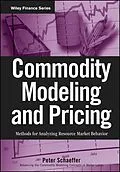Commodity Modeling and Pricing provides extensions and applications of state-of-the-art methods for analyzing resource commodity behavior. Drawing from the seminal work of Professor Walter Labys on the development of econometric methods for forecasting commodity prices, this collection of essays features expert contributors ranging from practitioners in private industry, public sector, and nongovernmental organizations to scholars in higher education-all of whom were Labys's former students or collaborators. Filled with in-depth insights and expert advice, Commodity Modeling and Pricing contains the information you need to excel in this demanding environment.
Autorentext
PETER SCHAEFFER is Professor of Economic Policy at West Virginia University and served as a director of the Division of Resource Management, which includes the Division of Agricultural and Resource Economics, from 1993 to 2006. He was a visiting professor of regional and environmental economics at the Swiss Federal Institute of Technology, Zurich, and a visiting scholar at the International Labour Organization in Geneva.
Klappentext
How to effectively analyze, model, and forecast today's commodity markets
Resource commodity markets play a central role in economic development, international trade, and global economic and political stability. The onset of globalization and the spectacular growth and industrial development of China, India, and other Southeast Asian countriesalong with an increased use of agricultural commodities for ethanol productionhave significantly added to total resource commodity demands and caused unprecedented price increases. Today, the economic analysis and modeling of world commodity markets is more important than ever before.
Commodity Modeling and Pricing provides extensions and applications of state-of-the-art methods for analyzing resource commodity behavior. Drawing from the seminal work of Professor Walter Labys on the development of econometric methods for forecasting commodity prices, this collection of essays features expert contributors ranging from practitioners in private industry, public sector, and nongovernmental organizations to scholars in higher educationall of whom were Labys's former students or collaborators.
The essays are divided into four parts according to the issues they address. In Part I, the dynamic behavior of commodity prices is analyzed in terms of its nonlinear chaotic and cyclical properties. In Part II, commodity inventory adjustments are then introduced to the price framework. Part III applies innovative modeling methods to the supply and demand aspects of commodity markets as a multivariate equilibrating mechanism. In Part IV, these modeling efforts are expanded beyond direct market phenomena to include the interactions between commodities, other forms of resources, and the environment. The resource commodities studied vary among chapters but, in total, include aluminum, coal, cocoa, coffee, copper, corn/maize, cotton, crude oil, gold, lead, rice, rubber, silver, soybeans, sugar, tea, tin, water, wheat, wine, wool, and zinc.
In recent years, we have rediscovered the severe consequences of resource exhaustion, environmental damage, and market instability. Commodity Modeling and Pricing provides a perspective for future problem solving and research, offering the latest available information on the application of a variety of econometric, programming, and related modeling methods that would help us to analyze, predict, and provide policy to deal with these critical economic and environmental problems.
Inhalt
Preface ix
Acknowledgments xi
Part One Dynamics of Commodity Price Behavior 1
Chapter 1 Indirect Inference and Long Memory: A New Truncated-Series Estimation MethodArmand Sadler, Jean-Baptiste Lesourd, and Vêlayoudom Marimoutou 3
Chapter 2 Procyclicality of Primary Commodity Prices: A Stylized Fact? A. Behrooz Afrasiabi 30
Chapter 3 Nonlinear Features of Comovements between Commodity Prices and InflationCatherine Kyrtsou 52
Chapter 4 The Oil Price and the Dollar ReconsideredSadek Melhem and Michel Terraza 65
Part Two Inventory Dynamics and Price Behavior 77
Chapter 5 Time-Varying Ratios of Primary and Scrap Metal Prices: Importance of InventoriesIrene M. Xiarchos 79
Chapter 6 Metal Prices and the Supply of StoragePaul Crompton and Irene M. Xiarchos 103
Chapter 7 Testing for Temporal Asymmetry in the Metal Price-Stock RelationshipEugene Kouassi 118
Chapter 8 Do Fluctuations in Wine Stocks Affect Wine Prices?James O. Bukenya 136
Part Three Dynamics of Resource Markets 167
Chapter 9 Dynamic Quadratic Programming in Process ControlBruce A. Bancroft 169
Chapter 10 Pollution Taxes and Price Control in the US Coal Market: A Rent Minimization ModelChin W. Yang and Ming-Jeng Hwang 176
Chapter 11 A Forecasting Simulation of Coal in Indonesia's Energy Future Ukar W. Soelistijo 185
Chapter 12 Structural Decomposition Analysis of Changes in Material Demand in the U.S. EconomyAdam Rose and Chia-Yon Chen 195
Part Four Environmental Resource Dynamics 209
Chapter 13 Linking Trade and the Environment in ChinaHaixiao Huang 211
Chapter 14 Critical Needs in China's Water ResourcesAndres Liebenthal 229
Chapter 15 Public Input in Rural Land Preservation: Modeling Preference Asymmetries in Stated Preference DataRobert J. Johnston and Kelly Giraud Cullen 247
Chapter 16 African Women in Mining PartnershipsBrigitte Bocoum 267
Epilogue Conclusions and PerspectiveWalter C. Labys 279
List of Contributors 289
Index 295
